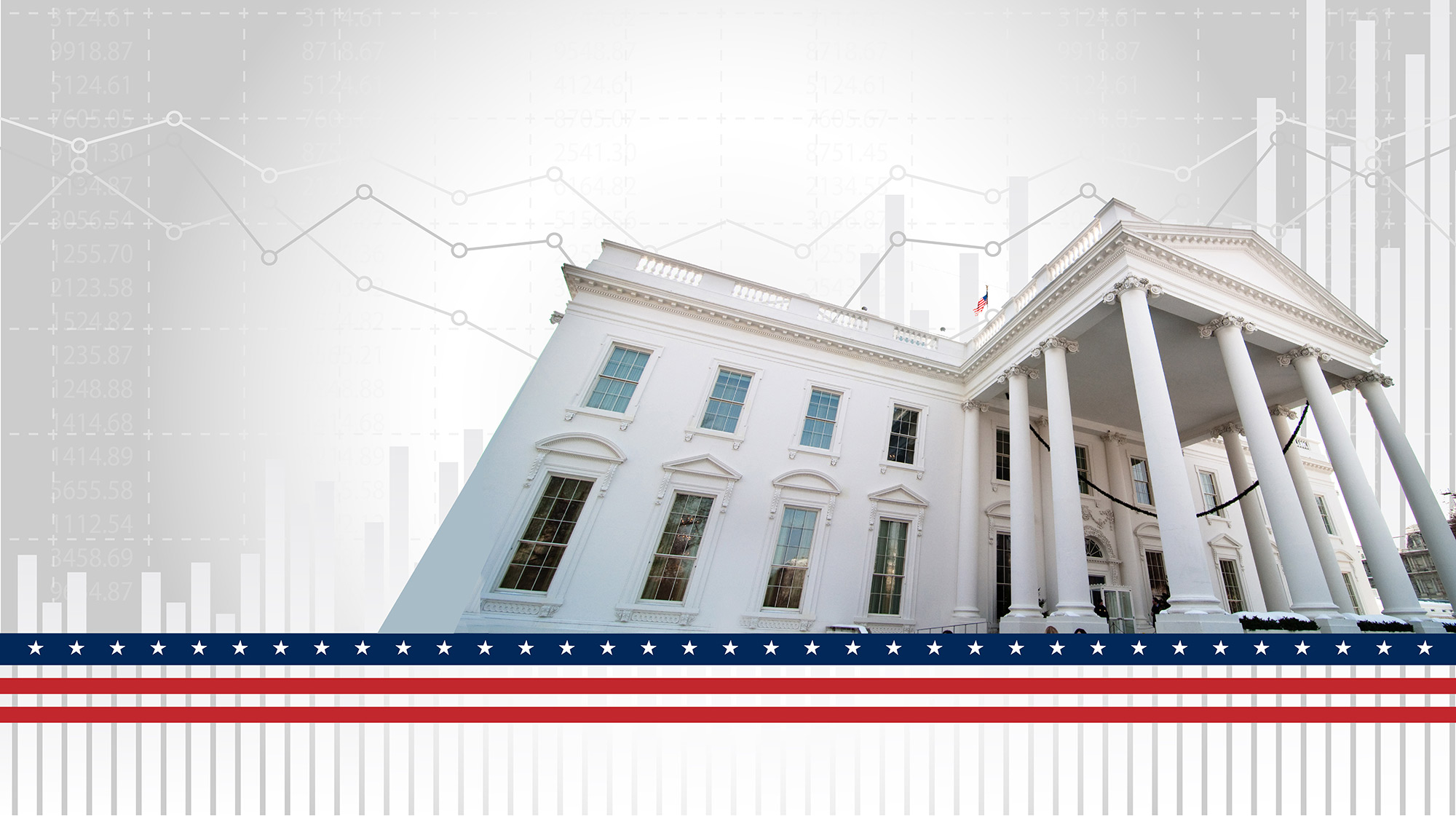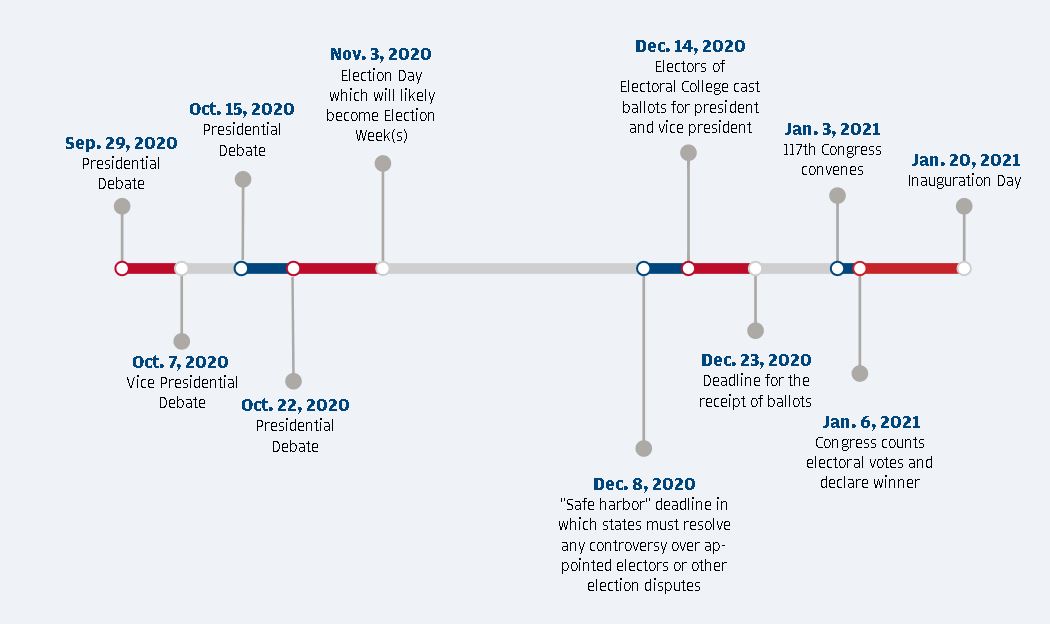
Democratic candidate Joe Biden captured enough Electoral College votes to win the U.S. Presidency (subject to recounts and court challenges), with the market now turning its attention to the implications of a divided government.
Whether Biden leads a unified or divided government may not be known until early 2021, meanwhile, President Trump has not yet conceded the election. The safe harbor date for states to certify election results is December 8, while the Electoral College members place their votes on December 14. December 23 is the deadline for the President of the Senate (the Vice President) and designated officials to receive all state electoral ballots, with Congress responsible for counting electoral votes and declaring a winner on January 6, 2021. The inauguration for the next administration takes place on January 20.
In this report, J.P. Morgan Global Research examines the implications for markets of a Biden presidency and a split government.
U.S. election 2020: What we know so far
Biden seems on course to secure about 51% of the popular vote (3% edge over Trump) and 57% of the Electoral College vote, extending a three-decade tradition of a fairly evenly divided electorate (see chart below).
Since the early 1990s, seven of eight Presidential elections have been won with 51% or less of the popular vote and by a margin of 0.5% (Bush vs. Gore) to 8.5% (Clinton vs. Dole). The overall result is consistent with at least 50 years of elections in which no incumbent has been re-elected if he entered the race with a sub-50% approval rating or with a U.S. unemployment rate of 7-8%.
So, despite the criticism of faulty polling data and erratic moves in betting markets on election night, this race is reasonably in line with historical precedents and recent surveys. Biden prevailed, his margin was average (3% of the popular vote) and he flipped most of the swing states he was expected to (Michigan, Wisconsin, Michigan and Pennsylvania and maybe Arizona). Georgia may flip too, which few predicted.
If, by January, it is clear that the U.S. electorate has fired President Trump but not the Republican Party, the historical significance is quite large: in the past 50 years, White House control has only flipped once without the new President also controlling Congress.
John Normand
Head of Cross-Asset Fundamental Strategy, J.P. Morgan
Presidential wins and the popular vote
The more consequential polling surprise is coming in Congress, where Democrats appear to have lost a fraction of their House majority and have yet to take the Senate, though the latter could still result in a 50/50 split after run-off elections for two Georgia Senate seats on January 5. Should the Democrats prevail (Georgia last sent two Democrats to Washington in the early 2000s), then Vice President-elect Harris would cast the deciding vote in the event of ties, effectively securing the Democratic sweep.
“If, by January, it is clear that the U.S. electorate has fired President Trump but not the Republican Party, the historical significance is quite large: in the past 50 years, White House control has only flipped once without the new President also controlling Congress (Reagan in 1980). And by now, most investors are aware of how short the Biden agenda becomes in terms of transformational policy across various sectors if Democrats will lack Congressional control,” said John Normand, Head of Cross-Asset Fundamental Strategy at J.P. Morgan.
A historically wide ideological gap between the major parties and an increasing frequency of close elections means that transformative change is unlikely, with the use of Executive Orders to dictate policy here to stay.
“Executive Orders can be used to cover a range of policies, including energy reform, immigration, trade policy, and anti-trust and regulatory policy,” added Joyce Chang, Chair of Global Research at J.P. Morgan.
President-elect Joe Biden and his transition team’s first announcement on November 9 was the creation of a 13-member COVID-19 task force. This announcement coincided with Pfizer’s announcement that the BNTX 162 vaccine demonstrated more than 90% efficacy in the Phase 3 trial of a COVID-19 vaccine.
Beyond the news on advancements of a vaccine, market attention will turn to whether a mini fiscal stimulus bill can be passed in the ‘lame duck’ congressional session, coinciding with the extension of the government funding bill, which expires on December 11.
“We now see a path toward a significant stimulus package getting done towards the end of the first quarter in 2021, particularly given the recent deterioration in the public health situation. Such a stimulus deal would provide a meaningful boost to growth in Q2 and beyond,” said Mike Feroli, Chief U.S. Economist at J.P. Morgan.
A divided government could temper a more aggressive taxation or regulation agenda that might have materialized under a “blue wave” and bodes well for risky assets, added Matt Jozoff, Co-Head of Fixed Income Research at J.P. Morgan.
U.S. election 2020: Biden’s inheritance and a divided government?
Democratic candidate Joe Biden has captured enough Electoral College votes to win the U.S. Presidency (subject to recounts and court challenges), with the market now turning its attention to the implications of a divided government. J.P. Morgan Global Research looks at what economic and market conditions Biden is set to inherit and what a split government could mean for markets.
How will the 2020 U.S. presidential election affect stock markets?
Despite the recent uptick in market volatility, the outlook for U.S. equity and credit markets is constructive, even with a divided government.
“For U.S. stocks, this is likely the best of both worlds,” said Marko Kolanovic, Head of Macro and Quantitative Derivatives Strategy at J.P. Morgan.
“A potential Republican Senate majority should ensure that Trump’s pro-business policies stay largely intact, particularly the tax code and the direction the country has taken is toward the center,” added Kolanovic.
The equity market is facing one of the best backdrops for sustained gains in years. After a prolonged period of elevated risks which include the global trade war, COVID-19 pandemic and U.S. election uncertainty, the outlook is significantly clearing up.

Dubravko Lakos-Bujas
Head of Global Markets Strategy, J.P. Morgan
J.P. Morgan Research U.S. equity strategists now expect to see the S&P 500 surpassing its longstanding price target of 3,600 before year-end and reaching 4,000 by early next year, with a good potential for the market to move even higher (around 4,500) by the end of next year.
“The equity market is facing one of the best backdrops for sustained gains in years. After a prolonged period of elevated risks which include the global trade war, COVID-19 pandemic and U.S. election uncertainty, the outlook is significantly clearing up,” said Dubravko Lakos, Head of U.S. Equity and Quantitative Strategy at J.P. Morgan.
J.P. Morgan Research has also revised up its 2021 earnings per share (EPS) estimate by $8 to $178 (consensus $168.26) and introduced 2022 EPS of $200 (consensus $194.69).
Apart from U.S. equities, emerging market (EM) equities have been upgraded to overweight versus developed markets (DM).
“We believe that markets are primed for a broadening in leadership, having seen record ever bifurcation so far this year. Style-wise, growth has dramatically beaten value and regionally the U.S. and China have strongly outperformed Europe and EM excluding Asia,” said Mislav Matejka, Head of Global and European Equity Strategy at J.P. Morgan.
“We have been overweight tech vs financials, but have recently taken profits, upgrading banks. Regionally, we think that a Biden victory will result in lower trade uncertainty and potentially stronger EM foreign exchange. We have been overweight China through this year and now add other EMs, moving EM vs. in aggregate to overweight,” Matejka added.

Key U.S. political events and electoral reporting timeline. Source: J.P. Morgan Strategic Research.
How will the 2020 U.S. presidential election affect market volatility?
As it has become clear that split control of government is the most likely outcome, so too has the possibility for higher levels of overall policy uncertainty which tends to be higher when election margins are tighter.
“This is bullish for medium-term volatility, particularly in longer maturities less anchored by Federal Reserve (Fed) policy, through several channels: event risk pricing, term premium, and policy uncertainty,” said Josh Younger, Head of U.S. Interest Rate Derivatives Research at J.P. Morgan.
In bond markets, the J.P. Morgan U.S. Fixed Income team sees spread products outperforming Treasuries in the months ahead as Fed policy remains supportive and sponsorship is extremely positive, with Fed support and banks’ demand for bonds likely to stay strong.
“Treasury yields traversed a wide range during the week after elections, and we look for modestly rising long-term rates,” added Alex Roever, Head of U.S. Rates Strategy.
This is bullish for medium-term volatility, particularly in longer maturities less anchored by Federal Reserve (Fed) policy, through several channels: event risk pricing, term premium, and policy uncertainty.
Josh Younger
Interest Rate Derivatives Research, J.P. Morgan
However, DM bond trades should be avoided for now according to Normand, as the equity risk premium, earnings yield minus real bond yield at 5.3%, is above average for an incoming President, even though outright equity multiples are high. So equities remain cheap relative to bonds.
Elsewhere, EM stand to benefit from the reduction in event risk premium. “Emerging Markets saw firm risk-on sentiment the week after the U.S. elections as we will likely see a shift in the tone and tenor of U.S.-China negotiations that emphasizes multilateralism and an acceptance of international norms for dispute resolution instead of unilateral U.S. sanctions,” said Luis Oganes, Head of Currencies, Emerging Markets (EM) and Commodities Research.
This in turn reinforces the J.P. Morgan bullish view on the Chinese yuan, with the FX Strategy team now forecasting the U.S. dollar/ yuan foreign exchange rate to test 6.25 next year and the team remain overweight EM FX overweight via Asia.
“For the U.S. dollar, we have questioned the extent to which the pro-risk move lower in the dollar could continue. We took an agnostic view on the U.S. elections preferring instead to focus on more projectable and durable themes like growth momentum, relative quantitative easing and balance of payments dynamics,” said Daniel Hui, Global Foreign Exchange Strategist at J.P. Morgan.
“We have been overweight tech vs financials, but have recently taken profits, upgrading banks. Regionally, we think that a Biden victory will result in lower trade uncertainty and potentially stronger EM foreign exchange. We have been overweight China through this year and now add other EMs, moving EM vs. in aggregate to overweight,” Matejka added.
Related insights
-

Global Research
Global Research
Leveraging cutting-edge technology and innovative tools to bring clients industry-leading analysis and investment advice.
-

Global Research
Have oil prices reached an inflection point?
May 27, 2020
What lies ahead for global oil demand, supply cuts and the price difference between the two major oil benchmarks, WTI and Brent Crude.
-

Global Research
Examining the COVID-19 impact across markets
October 01, 2020
Highlights from the Global Research team on the implications of COVID-19 for the global economic and markets outlook. Each month, we will feature the key reports published.
This communication is provided for information purposes only. Please read J.P. Morgan research reports related to its contents for more information, including important disclosures. JPMorgan Chase & Co. or its affiliates and/or subsidiaries (collectively, J.P. Morgan) normally make a market and trade as principal in securities, other financial products and other asset classes that may be discussed in this communication.
This communication has been prepared based upon information, including market prices, data and other information, from sources believed to be reliable, but J.P. Morgan does not warrant its completeness or accuracy except with respect to any disclosures relative to J.P. Morgan and/or its affiliates and an analyst's involvement with any company (or security, other financial product or other asset class) that may be the subject of this communication. Any opinions and estimates constitute our judgment as of the date of this material and are subject to change without notice. Past performance is not indicative of future results. This communication is not intended as an offer or solicitation for the purchase or sale of any financial instrument. J.P. Morgan Research does not provide individually tailored investment advice. Any opinions and recommendations herein do not take into account individual client circumstances, objectives, or needs and are not intended as recommendations of particular securities, financial instruments or strategies to particular clients. You must make your own independent decisions regarding any securities, financial instruments or strategies mentioned or related to the information herein. Periodic updates may be provided on companies, issuers or industries based on specific developments or announcements, market conditions or any other publicly available information. However, J.P. Morgan may be restricted from updating information contained in this communication for regulatory or other reasons. Clients should contact analysts and execute transactions through a J.P. Morgan subsidiary or affiliate in their home jurisdiction unless governing law permits otherwise.
This communication may not be redistributed or retransmitted, in whole or in part, or in any form or manner, without the express written consent of J.P. Morgan. Any unauthorized use or disclosure is prohibited. Receipt and review of this information constitutes your agreement not to redistribute or retransmit the contents and information contained in this communication without first obtaining express permission from an authorized officer of J.P. Morgan.